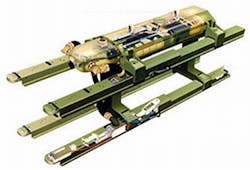Lockheed Martin to provide Hellfire airborne missile launchers to militaries of four Asian countries
REDSTONE ARSENAL, Ala., 30 Jan. 2015. Airborne weapons experts at Lockheed Martin Corp. are helping equip the military forces of four Asian with the Hellfire air-to-ground missile under terms of a multi-year contract announced earlier this month.
Officials of the Army Contracting Command at Redstone Arsenal, Ala., are awarding a $28.2 million contract to the Lockheed Martin Missiles and Fire Control segment in Orlando, Fla., to provide M299 Hellfire missile launchers to the governments of Korea, Indonesia, Qatar, and Singapore.
The M299 Longbow Hellfire Launcher (LBHL) is a digital missile launcher that can carry and launch as many four of any combination of AGM-114 Hellfire missiles. The launcher was designed for the AH-64D Apache Longbow attack helicopter but also can be adapted to several other kinds of military manned and unmanned aircraft.
The launcher provides electronic functions required for the missile and launcher to communicate with the aircraft through MIL-STD-1760 and MIL-STD-1553 data bus interfaces.
Related: U.S. Military to sell Hellfire missiles to Iraq, Jordan, Indonesia, Saudi Arabia and Qatar
The quad-rail launcher also has been re-configured into a dual rail launcher for weight savings and use on smaller platforms and also into a single-rail configuration for use on unmanned aerial vehicles like the U.S. Predator and Reaper UAVs in which the launcher electronics is integrated onto the airframe.
The contract calls for Lockheed Martin to provide 320 M299 launchers and four launcher electronic assemblies in support of the Joint Attack Munitions Systems (JAMS). The contract includes spare parts and engineering support. On this contract Lockheed Martin will do the work in Orlando, Fla., and should be finished by the end of 2017.
For more information contact Lockheed Martin Missiles and Fire Control online at www.lockheedmartin.com/us/mfc or the Army Contracting Command-Redstone at www.acc.army.mil/contractingcenters/acc-rsa.

